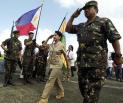Crisis in the Philippines
Election scandal and impeachment send Arroyo government reeling, and Filipinos to the streets

The Philippines is set to explode, as President Gloria Macapagal Arroyo faces impeachment after being caught in the act of rigging her 2004 re-election, sparking outrage and threats of popular revolt.
Military intelligence agents opposed to Arroyo wiretapped conversations between Arroyo and a man believed to be elections commissioner Virgilio Garcillano. In one of the damning May 2004 conversations, Arroyo is heard asking Garcillano (addressed by Arroyo as “Garci”) if she will win the election by more than 1 million votes:
“So, will I lead by more than 1 million?”
According to opponents of Arroyo, the infamous “Hello, Garci” phone call is definitive proof that Arroyo cheated in the election, which she won by about 1.1 million votes over Fernando Poe, Jr. (who died in December 2004 after allegedly suffering a stroke), amidst other allegations of vote manipulation.
Transcripts and digital files of the Arroyo wiretaps, and complete analysis of the scandal are available from the Philippine Center for Investigative Journalism and the alternative investigative site Bulatlat.
Arroyo has admitted that it was her voice on the tape, an absolute confirmation of her guilt, according to her opponents and critics. Arroyo, however, has only apologized for a “lapse in judgment”. Her attorneys and supporters have argued that the wiretaps were illegally obtained (therefore inadmissible as evidence). But the damage is done: just about every Filipino citizen has heard the tapes. The derision is so extensive, that the “Hello, Garci” call has been made into a popular cell phone ring tone.
The impeachment case against Arroyo will include charges of betrayal of public trust, culpable violation of the constitution, graft, corruption, and bribery. Vice President Noli de Castro may be the target of a separate impeachment. Arroyo will also be tried, as the commander of the Armed Forces of the Philippines, for the murder of political activists and other civilians, and death squad activities over the past three years. Ten cabinet members, who recently resigned their posts, have called on Arroyo to resign. The former cabinet members have expressed their willingness to testify against Arroyo.
Outraged lawmakers and citizens are promising a “people power” revolt, if pro-Arroyo majority forces obstruct or derail the impeachment. The regimes of Ferdinand Marcos (1986) and Joseph Estrada (2001) were ousted by popular revolts.
A lesson for Americans
The new Philippine crisis presents another sobering example of how people in nations outside of the Anglo-American axis grasp the concepts of democracy and liberty better than those inside the “elite bubble” ever will. Filipinos are taking to the streets, raising their collective voices, and fighting for ethical government. They are being active and creative with their protest. They know what is at stake. The yoke of imperialism, and the stink of corruption, are all too familiar to Filipinos, and they are taking action.
By comparison, the Bush administration has committed crimes of unprecedented scope and scale, on a virtual daily basis for nearly five years. Three consecutive stolen elections, 9/11, the “war on terrorism”, the Patriot Act, the invasions and occupations of Afghanistan and Iraq, Plame/Rove, the Downing Street Papers, Abu Ghraib/Guantanamo and a long list of other blatant atrocities, have sparked little resistance (or even interest) among the most Americans. Tragic evidence of the triumph of social controls in the “developed” world.
Pacific linchpin
The emergency in the Philippines demands careful monitoring, and the importance of what unfolds cannot be overstated.
The US cannot afford to lose the Philippines, its key geostrategic pivot in the Pacific and the South China Sea, and its most important military-intelligence base in the region. The Arroyo government has been the Bush administration’s top “war on terrorism” ally in Asia. (See the six-part series “The United States in the Philippines: post-9/11 Imperatives”).
The US wiped out a quarter of the Filipino population in its 1899-1903 conquest of the Philippines. In the modern era, through ongoing covert operations and a series of brutal puppet regimes, the US has made the Philippines its top regional neo-colony, whose geostrategic importance increases as the US marches closer to a cold war with China.
It goes without saying that the Bush administration will follow tradition, and pull out all the stops to maintain US control over its most precious Pacific foothold, including doing what is necessary to prevent a popular revolt in the Philippines that could threaten US interests.

